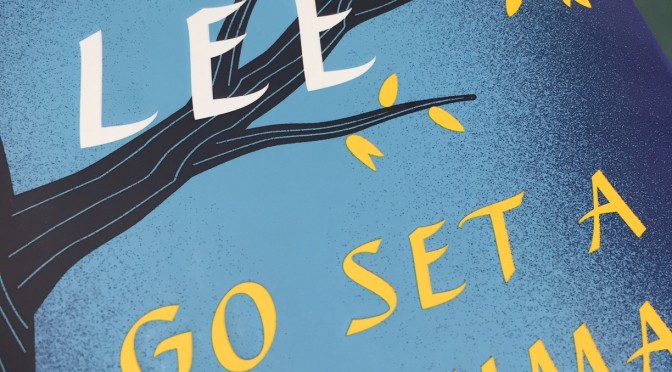When my copy of “Go Set A Watchman” by Harper Lee arrived I placed it on my nightstand untouched — for weeks. I circled it like a matador sizing up a bull. Did I want to read it? Was it best left a mystery? What if I read it and hated it? What if it forever changed my feelings about “To Kill A Mockingbird”? And so the book sat. Eventually I concluded I could not consider myself a person of literature if I never read it and so like one of those Russian polar bear swimmers I plunged.
I wish I could say the reading went swiftly but it didn’t. I wanted to make sure I gave this book it’s best opportunity to shine so I read slowly, meticulously, and thoughtfully. The chapters crept by and I took the time to reflect on the story, the language and the purpose of the author.
This is really two books that have been clumsily merged into one. The first half of the book is filled with Jean Louise’s memories of her childhood as she wanders through her hometown of Maycomb. We hear of familiar characters – Jem, Dill, Atticus and we meet some new ones – Aunt Alexandra, Dr. Finch and Henry. However, the first half of the book feels like a continuation of “To Kill A Mockingbird”. We see glimmers of Harper Lee’s unique style and the Southern tone that infects all of her writing. This passage where she describes Atticus sang out as the Harper Lee voice we all know:
“Atticus Finch’s secret of living was so simple it was deeply complex: where most men had codes and tried to live up to them, Atticus lived his to the letter with no fuss, no fanfare, and no soul-searching. His private character was his public character. His code was simple New Testament ethic, its rewards were the respect and devotion of all who knew him. Even his enemies loved him, because Atticus never acknowledged that they were his enemies. He was never a rich man, but he was the richest man his children knew.”
Somewhere around chapter 7 the book shifts and we discover what Lee really wanted to tell us. And this second story, well, it has left me itchy. During this time in our American history, when we struggle to make sense of race relations, or to discuss difficult topics respectfully, this book seems particularly relevant and important.
Lee shows us a Jean Louise struggling to be comfortable in her own beliefs and the beliefs of others. She comes back to Maycomb only to discover that she’s changed, or Maycomb has changed. In the end she realizes neither has changed but they are just seeing each other truthfully for the first time. And that stripped down nakedness is uncomfortable, enlightening and a bit disappointing.
One of the more poignant sections of the book comes when Jean Louise is challenged to define the word bigot and realizes that perhaps even in her enlightened state she too is a bigot – a person incapable of even entertaining or considering an opposing opinion or belief.
“Jean Louise rose and went to the bookshelves. She pulled down a dictionary and leafed through it. ‘Bigot’, she read. ‘Noun. One obstinately or intolerably devoted to his own church, party, belief, or opinion.’ Explain yourself, sir.’
“I was tryin’ to answer your running question. Let me elaborate a little on the definition. What does a bigot do when he meets someone who challenge his opinions?” He doesn’t give. He stays rigid. Doesn’t even try to listen, just lashes out…”
As the reader I sat there stunned by the accusations being laid at my feet. My Facebook feed is filled with opinions so strong, so staunch so contrary to each other that we are all bigots. Every single one of us and Lee forces us to face that in ourselves. This country is young – like Jean Louise – and before we reach adulthood we must face the bigotry inside of all of us and only then can we mature.
In the end, I’m glad I read the book. Harper Lee has once again provided us with an avenue to talk about race relations. She has shown us the power of humility and the importance of respect. And it feels like we needed to hear this more today than ever before.

